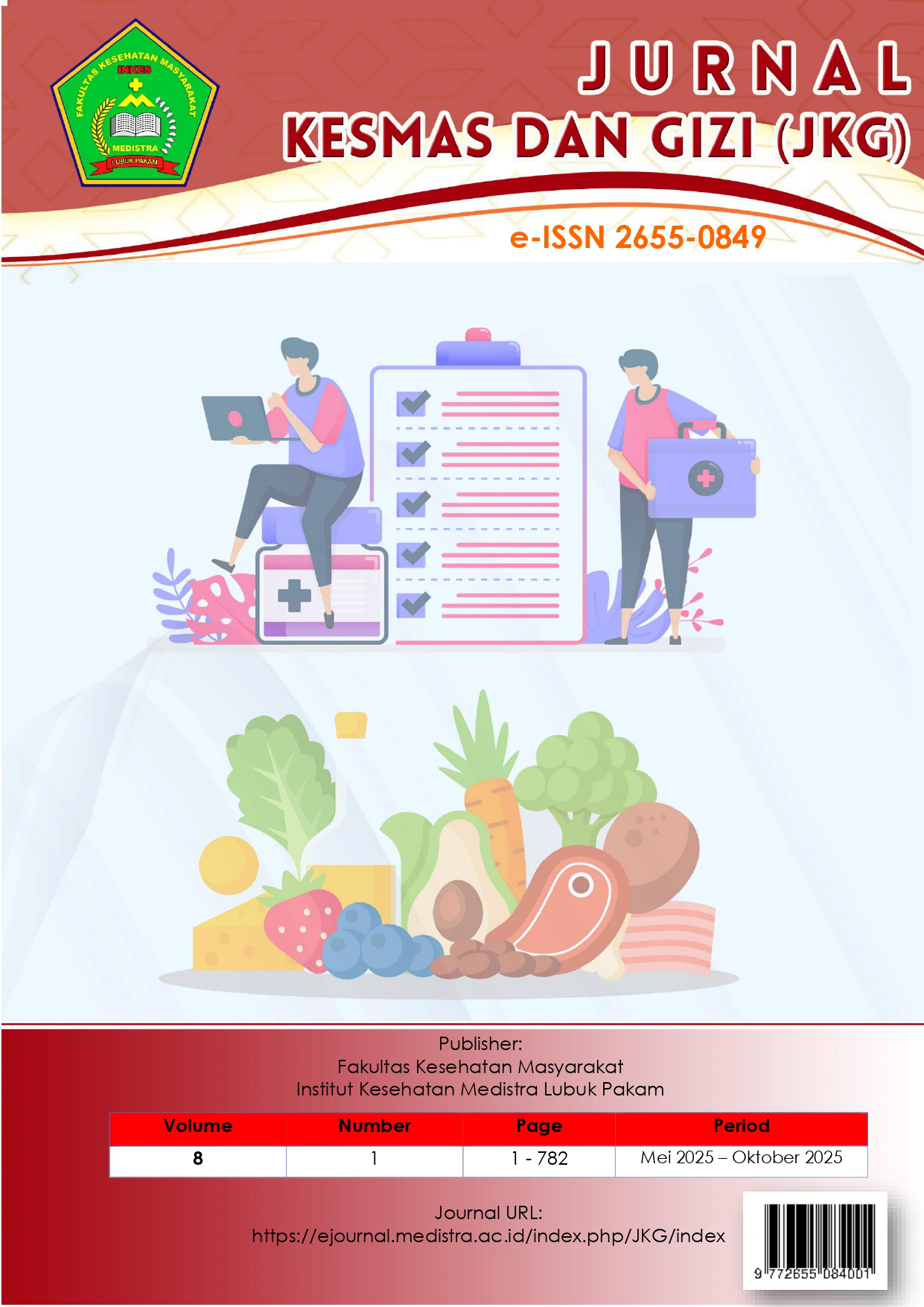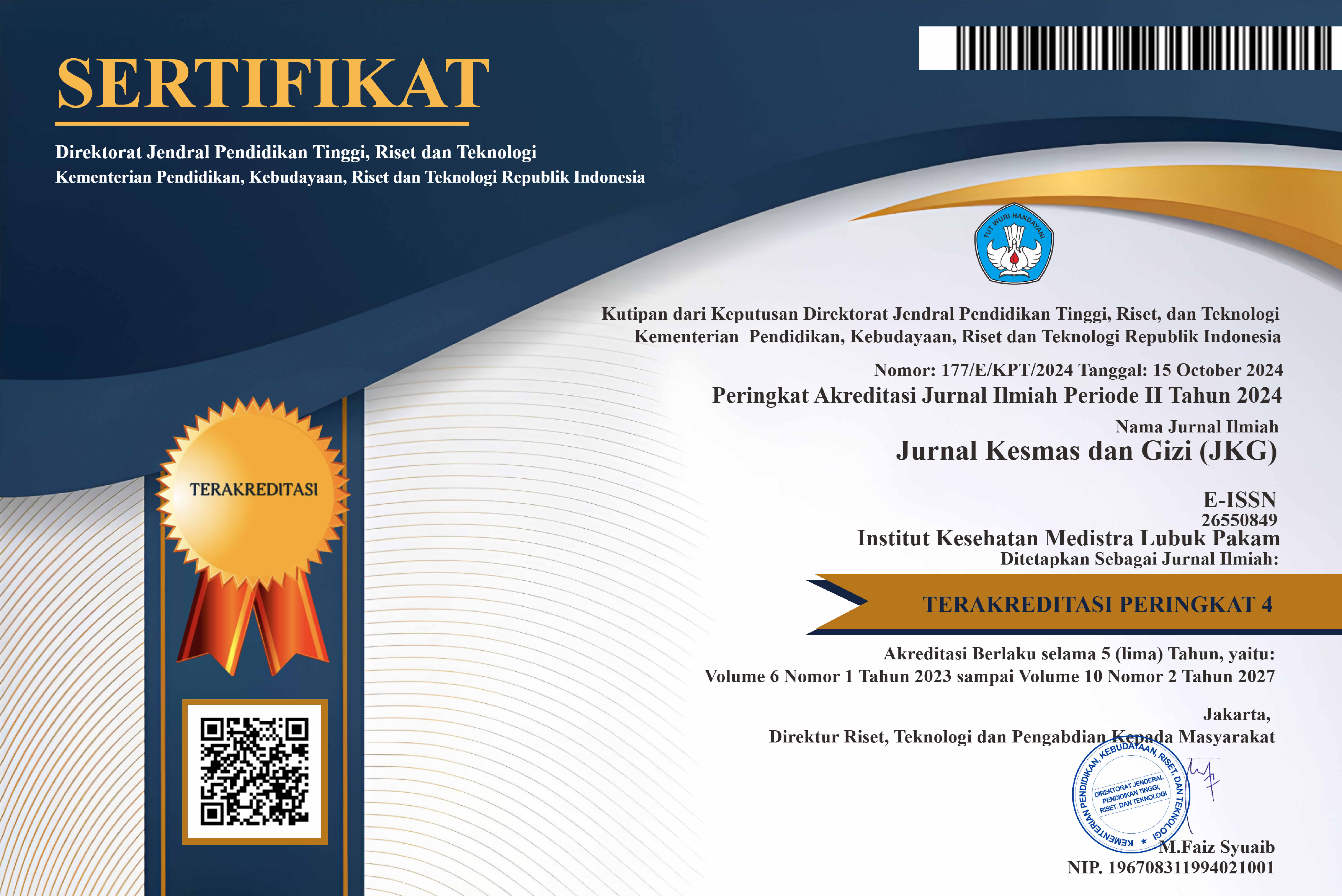Ultra-Processed Food (UPF) Consumption and The Risk of Mental Health Problems among Adolescents: A Narrative Review
DOI:
https://doi.org/10.35451/zwwvr725Keywords:
ultra-processed food; UPF; remaja; kesehatan mental; narrative reviewAbstract
Background: Mental health problems are increasing among adolescents. One modifiable risk factor is diet, particularly the consumption of ultra-processed foods (UPF), which is notably high in this age group. Objective: This narrative review aims to summarize recent scientific evidence on the association between UPF consumption and the risk of mental health problems in adolescents. Methods: A literature search was conducted using two major databases (Google Scholar and PubMed) with the keywords (“ultra-processed food” OR “UPF”) AND (“adolescents” OR “teenagers” OR “youth”) AND (“depression” OR “anxiety” OR “mental health issues”). After a selection process involving title, abstract, and full-text screening, 11 articles were included in the narrative analysis, which involved identifying patterns, similarities, differences, and links between UPF consumption and adolescent mental health outcomes. Results: Most studies showed that high UPF consumption is associated with an increased risk of mental health issues among adolescents, including depression, anxiety, anxiety-induced sleep disturbance, internalizing and externalizing symptoms, and reduced quality of life. Some studies reported varying results based on gender, assessment tools, and population characteristics. Conclusion: High consumption of UPF may be a potential risk factor for mental health problems in adolescents. Nutrition education and policies limiting UPF intake should be considered as part of preventive and promotive strategies for adolescent mental health. Further longitudinal and interventional studies are needed to strengthen causal evidence and evaluate the effectiveness of preventive efforts.
Downloads
References
[1] World Health Organization (WHO). Adolescent Health [Internet]. [cited 2025 Jun 30]. Available from: https://www.who.int/health-topics/adolescent-health#tab=tab_1
[2] World Health Organization (WHO). Adolescent and young adult health [Internet]. 2024 [cited 2025 Jun 30]. Available from: https://www.who.int/news-room/fact-sheets/detail/adolescents-health-risks-and-solutions
[3] Kemenkes. Survei Kesehatan Indonesia (SKI) dalam Angka [Internet]. 2023. Available from: https://www.badankebijakan.kemkes.go.id/ski-2023-dalam-angka/
[4] Wickham SR, Amarasekara NA, Bartonicek A, Conner TS. The Big Three Health Behaviors and Mental Health and Well-Being Among Young Adults: A Cross-Sectional Investigation of Sleep, Exercise, and Diet. Front Psychol. 2020;11(December):1–10.
[5] Wang L, Martínez Steele E, Du M, Pomeranz JL, O’Connor LE, Herrick KA, et al. Trends in Consumption of Ultraprocessed Foods among US Youths Aged 2-19 Years, 1999-2018. JAMA - J Am Med Assoc. 2021;326(6):519–30.
[6] Gibney MJ. Ultra-processed foods: Definitions and policy issues. Curr Dev Nutr. 2019;3(2):1–7.
[7] Mesas AE, González AD, de Andrade SM, Martínez-Vizcaíno V, López-Gil JF, Jiménez-López E. Increased Consumption of Ultra-Processed Food Is Associated with Poor Mental Health in a Nationally Representative Sample of Adolescent Students in Brazil. Nutrients. 2022;14(24).
[8] Reales-Moreno M, Tonini P, Escorihuela RM, Solanas M, Fernández-Barrés S, Romaguera D, et al. Ultra-Processed Foods and Drinks Consumption Is Associated with Psychosocial Functioning in Adolescents. Nutrients. 2022;14(22).
[9] Lane MM, Gamage E, Travica N, Dissanayaka T, Ashtree DN, Gauci S, et al. Ultra‐Processed Food Consumption and Mental Health: A Systematic Review and Meta‐Analysis of Observational Studies. Nutrients. 2022;14(13):1–22.
[10] Wiss DA, LaFata EM. Ultra-Processed Foods and Mental Health: Where Do Eating Disorders Fit into the Puzzle? Nutrients. 2024;16(12):1–17.
[11] Machado-Rodrigues AM, Padez C, Rodrigues D, Dos Santos EA, Baptista LC, Liz Martins M, et al. Ultra-Processed Food Consumption and Its Association with Risk of Obesity, Sedentary Behaviors, and Well-Being in Adolescents. Nutr . 2024;16(22):1–13.
[12] Faisal-Cury A, Leite MA, Escuder MML, Levy RB, Peres MFT. The relationship between ultra-processed food consumption and internalising symptoms among adolescents from São Paulo city, Southeast Brazil. Public Health Nutr. 2022;25(9):2498–506.
[13] Werneck AO, Vancampfort D, Oyeyemi AL, Stubbs B, Silva DR. Joint association of ultra-processed food and sedentary behavior with anxiety-induced sleep disturbance among Brazilian adolescents. J Affect Disord. 2020;266(December 2019):135–42.
[14] Tian YR, Deng CY, Xie HC, Long QJ, Yao Y, Deng Y, et al. Ultra-processed food intake and risk of depression: a systematic review. Nutr Hosp. 2023;40(1):160–76.
[15] Werneck AO, Hoare E, Silva DR. Do TV-viewing and frequency of ultra-processed food consumption share mediators in relation to adolescent anxiety-induced sleep disturbance? Public Health Nutr. 2021;24(16):5491–7.
[16] Yang Y, Gao Y, Yi X, Hu Y, Zhao L, Chen L, et al. The impact of ultra-processed foods and unprocessed or minimally processed foods on the quality of life among adolescents: a longitudinal study from China. Front Nutr. 2024;11(November).
[17] Gratão LHA, Silva TPR da, Rocha LL, Jardim MZ, Oliveira TRPR de, Cunha C de F, et al. Common mental disorders in Brazilian adolescents: association with school characteristics, consumption of ultra-processed foods and waist-to-height ratio. Cad Saude Publica. 2024;40(4):e00068423.
[18] Lane KE, Davies IG, Darabi Z, Ghayour-Mobarhan M, Khayyatzadeh SS, Mazidi M. The Association between Ultra-Processed Foods, Quality of Life and Insomnia among Adolescent Girls in Northeastern Iran. Int J Environ Res Public Health. 2022;19(10):1–9.
[19] Zheng L, Sun J, Yu X, Zhang D. Ultra-Processed Food Is Positively Associated With Depressive Symptoms Among United States Adults. Front Nutr. 2020;7(December):1–9.
[20] Contreras-Rodriguez O, Reales-Moreno M, Fernández-Barrès S, Cimpean A, Arnoriaga-Rodríguez M, Puig J, et al. Consumption of ultra-processed foods is associated with depression, mesocorticolimbic volume, and inflammation. J Affect Disord. 2023;335(December 2022):340–8.
[21] Song Z, Song R, Liu Y, Wu Z, Zhang X. Effects of ultra-processed foods on the microbiota-gut-brain axis: The bread-and-butter issue. Food Res Int [Internet]. 2023;167(November 2022):112730. Available from: https://doi.org/10.1016/j.foodres.2023.112730
Downloads
Published
Issue
Section
License
Copyright (c) 2025 Fhadilla Amelia

This work is licensed under a Creative Commons Attribution 4.0 International License.
Copyright in each article is the property of the Author.



























